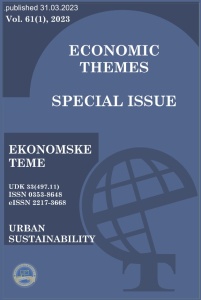Economic Themes (2023) 61 (1) 6, 105-119
Danica Šantić, Milica Langović, Dejan Ž. Đorđević
Abstract: Sustainable spatial transformation, urban governance, and the constraints of urban-rural development can be traced through migration. In the Republic of Serbia, after the rapid increase in the number of people living in urban areas due to internal migration, structural changes in settlements have begun with natural decline and emigration. However, the far-reaching effects of migration on shrinkage have received little attention in policy or practice. To shed light on and predict possible future patterns, this paper looks at the attitudes and intentions of the population towards migration and identifies determinants that influence migration plans for possible future flows inside and from the Republic of Serbia. The paper is based on data from a survey and interviews conducted in the area of the City of Leskovac (N = 1124) with the population 20 + years, local authorities, civil society and the private sector, i.e. those who play a central role in addressing the challenges and optimizing the opportunities created by the growing trend of migration. The survey results show that most respondents support the emigration process, which is mainly influenced by economic factors. In this context, the trend of emigration is expected to continue in the future, and it is perceived as an obstacle to achieving sustainability goals and rarely as an opportunity.
Keywords: urbanization; migration; attitudes; intentions; Serbia; City of Leskovac; sustainable development
URBAN SUSTAINABILITY THROUGH THE LENS OF MIGRATION - CASE STUDY: CITY OF LESKOVAC, SERBIA
Danica Šantić, Milica Langović, Dejan Ž. Đorđević
Abstract: Sustainable spatial transformation, urban governance, and the constraints of urban-rural development can be traced through migration. In the Republic of Serbia, after the rapid increase in the number of people living in urban areas due to internal migration, structural changes in settlements have begun with natural decline and emigration. However, the far-reaching effects of migration on shrinkage have received little attention in policy or practice. To shed light on and predict possible future patterns, this paper looks at the attitudes and intentions of the population towards migration and identifies determinants that influence migration plans for possible future flows inside and from the Republic of Serbia. The paper is based on data from a survey and interviews conducted in the area of the City of Leskovac (N = 1124) with the population 20 + years, local authorities, civil society and the private sector, i.e. those who play a central role in addressing the challenges and optimizing the opportunities created by the growing trend of migration. The survey results show that most respondents support the emigration process, which is mainly influenced by economic factors. In this context, the trend of emigration is expected to continue in the future, and it is perceived as an obstacle to achieving sustainability goals and rarely as an opportunity.
Keywords: urbanization; migration; attitudes; intentions; Serbia; City of Leskovac; sustainable development

